Three Falls:
Facing Alzheimer’s and an Empty Nest
An essay by Beth Zienty
I always considered myself a very content daughter and mother, but in the fall of 2005, my roles began to shift. For 18 years I often mirrored my mother’s parenting with my kids, Heidi and Scott. Like Mom, I spent more time directing than disciplining. I steered them towards some of the same fun things I remembered from my childhood, like singing silly songs around the piano. I made them personalized paper dolls with clothes they could color. I took them on exploring adventures in search of everything from a Popeye statue in Illinois to a circus graveyard in Oklahoma. And throughout those years I turned to Mom for support and advice on everything from thumbsucking to real estate. But suddenly my world of mothering and being mothered changed.
During the summer of 2005, we moved Mom from St. Louis, the city where she was born, into an assisted living facility five minutes from my home in Houston. In August, Heidi left her parents, brother and dog, Molly, to begin college five states away. Both stepped into new worlds with lots of adjustments.
Mom was in the beginning stages of Alzheimer’s in a restricted environment, and Heidi was adjusting to the exciting and scary freedoms of college life. I observed them both, knowing one would soon need me less and the other much more. But during those autumn months their needs were amazingly similar, and I seemed to be playing the role of mother with both.
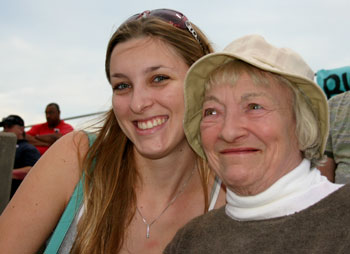 When I first moved my mother into her dorm-like living space, I made sure she had shampoo and tissue, stationery and books. I hung pictures and bought new towels. One month later I did the same with my daughter. Both were suddenly living in new cozy spaces…decorated and organized…eager and anxious. They adjusted to similar routines, juggling laundry up and down elevators and eating meals with strangers in large dining rooms. Both were stranded in new cities without cars. And both complained. When I first moved my mother into her dorm-like living space, I made sure she had shampoo and tissue, stationery and books. I hung pictures and bought new towels. One month later I did the same with my daughter. Both were suddenly living in new cozy spaces…decorated and organized…eager and anxious. They adjusted to similar routines, juggling laundry up and down elevators and eating meals with strangers in large dining rooms. Both were stranded in new cities without cars. And both complained.
Heidi whined about long walks to class. Mom longed for her Lexus and wondered why the doctor said she shouldn’t drive. Heidi grumbled because there was no Mexican or Chinese food in the cafeteria. Mom said the dining room food was bland and boring. Heidi said her dorm hall was dull and studious with pre-med students. My night owl mom complained that everyone went to bed at 7:00 pm.
By mid-fall, Heidi and Mom surprised me with sudden changes. Heidi proudly displayed her new independence by piercing her nose. Mom reacted to her lack of freedom by smoking, a habit she kicked 18 years earlier. “It’s soothing,” was Mom’s answer to my pleading, “Because I can,” was Heidi’s answer.
Mom and Heidi became more settled as fall progressed. Their once tidy and organized rooms began looking more lived in. A new compulsive shopping problem was evident in Mom’s room. Every surface was covered in reading material. There were stacks of magazines and scattered “New York Times” and always a few Barnes and Noble bags filled with books she “just couldn’t resist.” I tidied the room when Mom wasn’t there.
Lack of parental griping was the biggest reason for Heidi’s dorm clutter. Her surfaces were covered mostly with a mixture of dirty and clean laundry. Scattered books and papers were mixed in as well. I smiled and ignored the mess. That’s what my mother would have done.
By late fall, I began to hear more names in my conversations with Heidi and Mom. Heidi mentioned that she went to a concert with Maya and joined a basketball group with Daria. Mom talked about playing Bingo with Betty and going on lunch outings with Ellen. The more involved they became, the fewer complaints I heard. My daughter and mother still needed my support, but not always daily.
One morning in early December Heidi called, fretting over a possible eye infection. I gave her some suggestions along with some soothing words. I smiled and sighed as I hung up the phone. I was Mom again.
Later that evening I called my mother and mentioned I had a doctor’s appointment the next day. “Do you want me to go along and hold your hand?” she teased. I paused for a moment then laughed. “Yes I do!” I hardly needed handholding the next day, but Mom came along and we sat in the waiting room and chuckled over a copy of “Highlights Magazine.” I was daughter again. And Mom got to be Mommy.
Three years passed and my roles continued to change. I no longer compared Heidi and Mom, because they had little in common. I was proud of Heidi’s independence and frustrated by Mom’s neediness. I found myself playing a mom role I had never seen my mom perform. I nagged Mom to brush her teeth and reminded her that she was a diabetic when she ordered ice cream sundaes. I griped when she filled her counters with hoarded foods from the dining room. And I cringed when I saw her sunburned face, knowing she had spent the afternoon in the Texas sun with her cigarettes and puzzle books.
As autumn approached I was so distracted with this new level of my mother’s disease that I hardly had time to notice the lump in my throat, which was there to remind me that my husband and I would soon to be empty nesters. “You’ll still have Molly to mother.” My husband gently teased. “And Mom…” I reminded myself.
This time it was our son, Scott who was heading off for his first year of college. As I helped him pack up clothes for the fall, I did the same for my mother who was moving into “Silverado” a nearby facility for Alzheimer’s residents. Both would soon be living in smaller rooms with roommates they had never met. They would be stepping into new worlds with new faces and new routines.
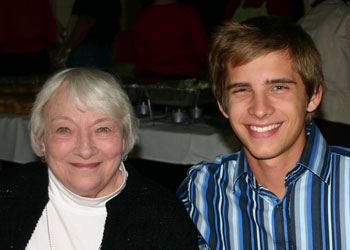 Once again I gladly took on my mothering role, doing my best to ease their transitions. Before Mom and Scott moved, I bought them bulletin boards and new single bed comforters. I packed snacks and photos, reading lamps and address books. I made sure Scott had a supply of aspirin and cold medicine and I loaded a zipper bag with Mom’s prescriptions. I knew that once they moved in I would worry about them. I would dread and crave the phone ringing, hoping for an upbeat voice, not a teary mother or a homesick son. I would mail postcards to their new addresses so they would know I was thinking of them. And I would try very hard to keep a little distance so they could adjust without my hovering supervision. Once again I gladly took on my mothering role, doing my best to ease their transitions. Before Mom and Scott moved, I bought them bulletin boards and new single bed comforters. I packed snacks and photos, reading lamps and address books. I made sure Scott had a supply of aspirin and cold medicine and I loaded a zipper bag with Mom’s prescriptions. I knew that once they moved in I would worry about them. I would dread and crave the phone ringing, hoping for an upbeat voice, not a teary mother or a homesick son. I would mail postcards to their new addresses so they would know I was thinking of them. And I would try very hard to keep a little distance so they could adjust without my hovering supervision.
It was a muggy, Texas morning the day Scott moved. The UT dorm was buzzing with students and parents, clumsily lugging overstuffed suitcases and overflowing boxes up flights of stairs. Scott’s tiny room was stuffy with two new students, two sets of parents and two semesters’ worth of living supplies. Nervous chatter filled the room while drawers were filled, computers were wired and the beds were made (probably for the last time).
Mom was the only new resident the day she moved in. It was late morning and residents with varying degrees of dementia were already involved in art projects and puzzles. Some of the residents sat on the patio or wandered up to pat one of the many residential cats and dogs. There was a mix of hominess and warmth and worry. I found myself feeling scared and protective as I encouraged Mom into this new environment. I searched the faces of other residents for signs of kindness or intelligence. Who might be Mom’s friend? I wondered. I found myself using a loud, overly enthusiastic tone to open conversation. And I wondered why this felt so familiar.
It dawned on me that I had last played this protective role 16 years earlier when Scott was hesitant about starting preschool. It was oddly comforting to find myself comparing Mom’s new beginning with Scott’s very first day of school. As Mom fought tears of confusion over her new surroundings, I remembered Scott’s quivery lip years ago. I remembered the high-pitched, eager voice I used to steer Scott towards an art table, the same voice I used to point out a flower-arranging group to Mom. With both I stayed positive and made sure they were involved before I left. With both I worried while I was away. Would they make friends? Would they ask for help? What if there was a potty accident?
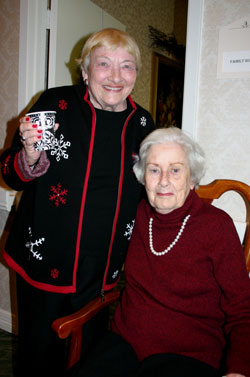 Mom survived her first day, just as Scott had years ago. Her transition took a few months…much longer than Scott’s adjustment to preschool or college. There were moments of sadness and frustration over things she missed. There were stresses with the adjustment to a roommate and difficulties in areas of hygiene. Mom survived her first day, just as Scott had years ago. Her transition took a few months…much longer than Scott’s adjustment to preschool or college. There were moments of sadness and frustration over things she missed. There were stresses with the adjustment to a roommate and difficulties in areas of hygiene.
Mom was surrounded by a supportive staff and caregivers who were there to deal with these issues, but I couldn’t give up my mothering role. I remembered how my mother had handled my grandmother’s complicated illness in her late life. I was encouraged to stay involved with Mom’s transition and I tried to let memories of her parenting guide me. But sometimes those memories made it harder. When Mom worried over a lamp she missed, I avoided the truth about a Goodwill truck taking it away. I cringed because I knew Mom had never approved of white lies and I was suddenly getting very good at them. When Mom and her roommate grew impatient with each other, I was tempted to use one of Mom's quirky parenting techniques and put the two “girls” in chairs facing each other until they giggled. When Mom became hysterical, insisting she needed no help getting bathed, I was torn with concerns for her safety and privacy.“I’m a private person!” she wailed. I remembered how Mom had always respected our closed doors and unlocked diaries when we were kids.
It was a long three months of adjusting and I was confused about my role. By the end of November, Mom seemed relaxed and she actually seemed to enjoy her smaller, simpler and safer new world at Silverado. She loved outings with family, but seemed eager to get back to her home and her roommate. They still fussed like sisters, but they also giggled and joked and even shared a crush on Obama. Mom still hoarded sugar packets and magazines, and she still wanted to comfort herself with cigarettes and puzzle books. But there was always a bustle of activity and a cheery caregiver to easily redirect Mom. So I began to step back and let staff worry over Mom’s eating and bathing and room clutter. I was happy to return to my role as a daughter.
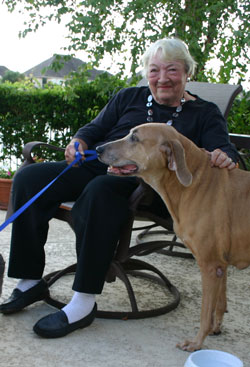 It has been five years since Mom moved closer and the kids began moving away. Heidi and Scott have grown into responsible adults and Mom seems happier as she grows more childlike. It’s much easier now. On a recent fall afternoon, I sat in my suddenly quiet family room patting old Molly Dog’s head. “I know you miss them, Molly.” The kids had just left after a weekend visit and I chuckled at the cereal bowls on the counter, the worn cushions and scattered magazines. Molly looked at me with her warm and tired eyes until I laughed and got her a goodie. “I miss them, too.” I laughed as Molly chomped at her treat. Only in recent months had I begun spoiling this sweet dog who was suffering from numerous old age ailments. I stroked her velvety ears and told her I had to get going and I’d be back later. Before heading to the car, I held her graying head a moment in my hands and absorbed her gold eyes and told her I loved her for the 100th time that day. It has been five years since Mom moved closer and the kids began moving away. Heidi and Scott have grown into responsible adults and Mom seems happier as she grows more childlike. It’s much easier now. On a recent fall afternoon, I sat in my suddenly quiet family room patting old Molly Dog’s head. “I know you miss them, Molly.” The kids had just left after a weekend visit and I chuckled at the cereal bowls on the counter, the worn cushions and scattered magazines. Molly looked at me with her warm and tired eyes until I laughed and got her a goodie. “I miss them, too.” I laughed as Molly chomped at her treat. Only in recent months had I begun spoiling this sweet dog who was suffering from numerous old age ailments. I stroked her velvety ears and told her I had to get going and I’d be back later. Before heading to the car, I held her graying head a moment in my hands and absorbed her gold eyes and told her I loved her for the 100th time that day.
I arrived at Silverado to find Mom in the dining room reaching over a full plate of food for a bite of cake. She looked up, grinned and waved her fork. “It’s my daughter! It’s my daughter!” She announced as I hustled over to squeeze her tight and kiss her soft cheek. “Woo Hoo, Mom! That cake looks good!” I laughed as I watch her devour the cake. I don’t care if she eats her cake first. I don’t care about anything except her happiness right now. After she finished I helped her stand with the walker. She had begun having difficulty remembering how to walk. The walker had become my special mom magnet, and with a few words of encouragement and a little pull on the walker, I was able to get mom headed for the patio. Mom’s muscles began to remember and she picked up speed. We were finally seated outside, enjoying a little evening air and our own special kind of conversation.
“You look just perfect. It’s a good, good pretty look. You’re very fresh.” She smiled and stared at me the way only children can stare.
“You make me feel so good, Mom!” I laughed. “And you look wonderful, too!”
“Oh Gad. It’s all over. There it is!” Her words tumbled out as she studied two butterflies in a nearby bush.
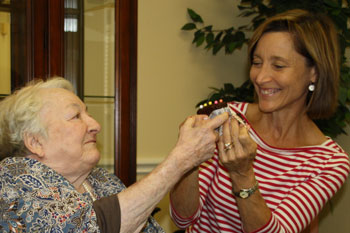 “Oh, yeah. Look at those butterflies, Mom.” I smiled and watched her enjoy. “Oh, yeah. Look at those butterflies, Mom.” I smiled and watched her enjoy.
“Did you say if it’s coming?” Her face nearly frowned. But I no longer fretted over her meaning.
“Well, I heard of one thing that’s coming to town, Mom. It’s the Ringling Brother’s Circus! Remember the summer when we visited the Ringling mansion in Sarasota?” I know she doesn’t remember, but she relaxed and smiled as I recalled our summer 40 years ago. I rambled on about clouds and other chatty tangents. Now and then I reached for her hand, or I hugged her shoulder and told her I loved her… for the 100th time. And when she looked at me with her soft, hazel eyes I was reminded of Molly’s golden ones. Eyes that communicate what words no longer can…a very simple message of love and thanks.
I enjoyed that moment on the patio. Mom no longer used my name, but she called me daughter and I call her Mom over and over. I know the day may come when my mother doesn’t recognize me at all, but I don’t worry over that. Like my mother, I’m living in the moment. And besides, when that day comes I will just slip back to my habit of comparing. No, I won’t compare her to my dog, Molly with her soulful eyes. I will no longer compare her to Scott starting preschool or Heidi beginning college. I’ll be reminded of my children when they were tiny babies just home from the hospital. And as I stroke my mother’s hand, I’ll remember how dearly I loved those precious, little bundles, even when they didn’t know me at all.
Back to top |